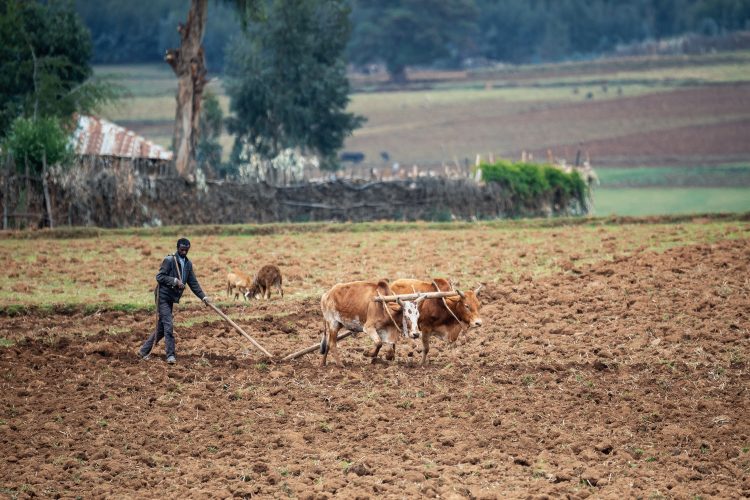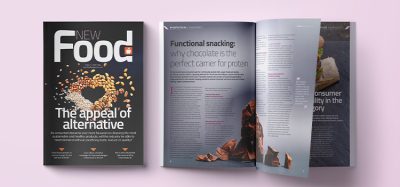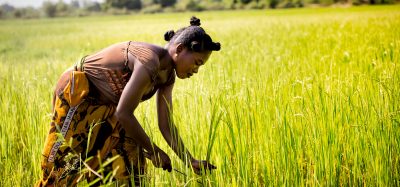Pandemic sparks food security crisis
- Like
- Digg
- Del
- Tumblr
- VKontakte
- Buffer
- Love This
- Odnoklassniki
- Meneame
- Blogger
- Amazon
- Yahoo Mail
- Gmail
- AOL
- Newsvine
- HackerNews
- Evernote
- MySpace
- Mail.ru
- Viadeo
- Line
- Comments
- Yummly
- SMS
- Viber
- Telegram
- Subscribe
- Skype
- Facebook Messenger
- Kakao
- LiveJournal
- Yammer
- Edgar
- Fintel
- Mix
- Instapaper
- Copy Link
Posted: 1 July 2020 | Bethan Grylls (New Food) | No comments yet
Following the UN’s Food Programme’s warning that the COVID-19 pandemic will double the number of people suffering acute hunger by the end of 2020, Olam International seeks new scientific research to help address the worldwide issue of food security.


Ethiopian farmer plows fields
Last year, 135 million people were identified by the United Nations (UN) World Food Programme’s report on food security as “in crisis or worse”.
‘The Global Report on Food Crises’ (GRFC) is a joint assessment of acute food insecurity situations around the world by 16 partners. This number is highest figure of food-insecure people in this position to be reported in the four years of the GRFC’s existence.
When comparing the 50 countries that were in both the 2019 and the 2020 reports, the population “in crisis or worse” rose from 112 to 123 million.
Although conflict/insecurity was the main driver of food crises in 2019, weather extremes and economic shocks have become increasingly significant.
Africa had the largest numbers of acutely food-insecure people in need of assistance in countries badly affected by weather events, particularly in the Horn of Africa and Southern Africa, followed by Central America and Pakistan.
Food security in a pandemic
The report highlights the increased dangers for those living in food-insecure areas as most vulnerable to the consequences of the global pandemic. According to the GRFC, this is due to a lack of, and in some cases, no capacity “to cope with either the health or socioeconomic aspects of the shock”.
“The upheaval that has been set in motion by the COVID-19 pandemic may push even more families and communities into deeper distress,” António Guterres, Secretary-General of the United Nations wrote in the 2020 report’s foreword.
Rising levels of unemployment will no doubt also impact people’s ability to access food.
On a more positive note, the report highlights that “harvests have been good and the 2020 outlook for staple crops is promising”. However, movement restrictions may cause disruption to transport and processing of foods. This will likely increase delivery time and reduce availability.
Time to innovate
Following the UN’s Food Programme’s warning of rising food insecurity, Olam International is seeking new scientific research that is able to deliver “transformational impacts within global agriculture” addressing the global food security issue.
The winner will receive a $75,000 grant to support the development of this technology and its deployment.
The Olam Prize for Innovation in Food Security (in partnership with Agropolis Fondation) requires clear evidence of potential short-term impact on food availability, affordability, adequacy and accessibility.
The winner of the previous prize was coordinated by Dr Tomaso Ceccarelli of Wageningen Environmental Research and Dr Elias Eyasu Fantahun of Addis Ababa University.
It involved a mapping technology, known as IM4FS, that helps provide smallholder farmers in Ethiopia a ‘best fit’ for what to grow, where and how, with the goal of improving productivity in food insecure locations.
Dr Ceccarelli has said the funding is being applied in four key areas. These are: “Engaging local and regional planners, in-situ data collection on bio-physical and socio-economic conditions, developing the GIS-based tool behind IM4FS, and application of site-specific crop recommendations based on the research fed into and information generated by the tool.
“With the unexpected outbreak of COVID-19, we’re also reviewing with our partners how IM4FS can support more immediate and urgent food security needs for farmers amid the pandemic. This would include planning efficient seed, fertiliser and other input distribution to farmers based on needs assessments.”
Applications for this year can be submitted here by 11 January 2021.
Related topics
Related organisations
Addis Ababa University., Olam, The Global Report on Food Crises, UN World Food Programme, United Nations, Wageningen Environmental Research







